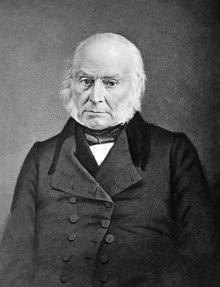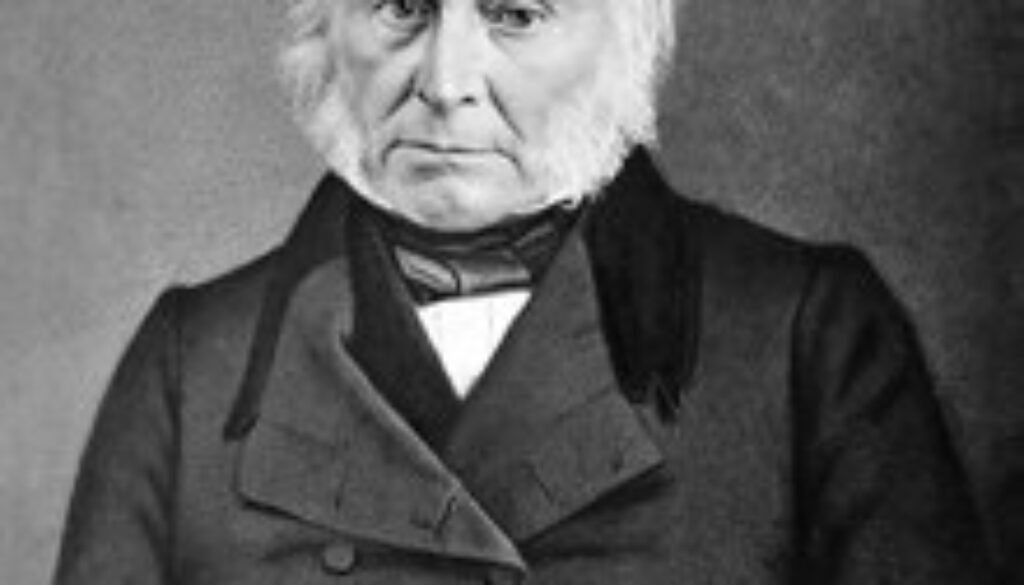John Quincy Adams Gets Pissed Off

I’ve been laboring through a book called John Quincy Adams and the Foundations of American Foreign Policy by Samuel Flagg Bemis. I couldn’t possibly recommend it unless, like me, you wish to be well informed about the career of America’s most studious and most diligent president, who, after his presidency, spend 35 years in the House of Representatives fighting the expansion of slavery and defending the integrity of the American republic.
Bemis, a fellow Yalie, like so many of his generation, is determined to be boring — and succeeds! Even the most dramatic scenes — as when young JQA watches the Battle of Bunker Hill from the heights in Quincy — Bemis refuses to make them interesting as if determined to adhere to a dry historical approach that excludes the general reader.
I had hoped to read JQA’s take on the Burr conspiracy of 1805, about which I wrote my senior thesis, but Bemis merely alludes to it, as if it is something every reader should know about.
Bemis is kind of like William Faulkner or JQA’s grandson Henry Adams — you might get what he’s saying, and you might get something interesting out of it, but he’s not going to help you,
He’s not like ‘popularizers’ like Barbara Tuchman or C.V. Wedgewood or Garrett Mattingly, who make history come alive for the general reader.
So this book is of value only if you’re a big JQA fan like me. And it has grounded me in the minutiae of the diplomacy of the United States in the late 1700s and early 1800s when the borders of our country were established.
In European affairs, JQA was better informed, by many orders of magnitude, than the average citizen. He was a friend of the Czar of Russia and when Napoleon took Moscow, he was in St. Petersburg.
Imagine being at the court of the Czar during the Napoleonic invasion of Russia, the subject of Tolstoy’s War and Peace. How exciting is that? Bemis scarcely mentions it. Too interesting for an academic determined to be boring.
So when JQA took on the negotiations to end the War of 1812 at Ghent, he was just taking over for his father, who had negotiated the settlement with Great Britain at the end of the Revolutionary War.
Since you’ve read your US history you know the Treaty of Ghent Dec. 1814, ending the War of 1812, was signed before Andrew Jackson’ great victory over the British at the Battle of New Orleans Jan 8, 1815.
So when John Quincy Adams is running for the presidency in 1822, one of his fellow negotiators at Ghent, Jonathan Russell, in 1822, tries to forge a letter of his to President Monroe in 1814, suggesting Adams was willing to offer the British the free navigation of the Mississippi River in exchange for the maintenance of the Newfoundland fisheries, that would benefit Massachusetts, in an attempt to alienate Western voters
JQA exposed the forgery, tho he had to forego his summer vacation in Quincy with his aged father, as well as a 25th anniversary trip he had promised his wife.
The whole story is too long and boring to present here, so of course Bemis recounts it in voluminous detail. Russell was disgraced and JQA was elected president by the House of Representatives.
But I really liked what JQA said to Russell when he first discovered the forgery. Russell told him, “I have acted from no motive of hostility against you.”
“Mr. Russell,” JQA replied, “I wish not to enquire into your motives. Henceforth, as a public man [he was then Secretary of State], if, upon any occasion whatever, I can serve you or your constituents, it will afford me as much pleasure as if nothing had ever occurred between us; but of private and individual intercourse, the less there is between us from this time forward the more agreeable it will be for me.”
That’s how you would say, “Fuck you and the horse you rode in on” back in 1822.
